In our latest Blogpost “Sectorwatch & My Kids’ Portfolio September Dividend Income Report” we wrote about the current bull market. But we all know that the next financial crisis is probably around the corner—we just don’t know from where and when…right? In today’s blogpost I want to review the three biggest dangers or possible triggers for a possible stock market correction. Last Friday me and Mrs. Dividendcake did watch the movie “The Margin Call” . The principal story takes place over a 24-hour period at a large Wall Street investment bank during the initial stages of the financial crisis of 2007–08.
Where will the next crisis come from? Deutsche Bank says there are plenty of things to worry about. Italy has a massive debt burden, a brittle banking system, and a dysfunctional government. China may have a property bubble on its hands and has long been fueling its growth with debt. Populist political parties could disrupt the world order as we’ve known it. So let’s review and describe the three dangers.
Danger 1 : The Mountain of DEBT
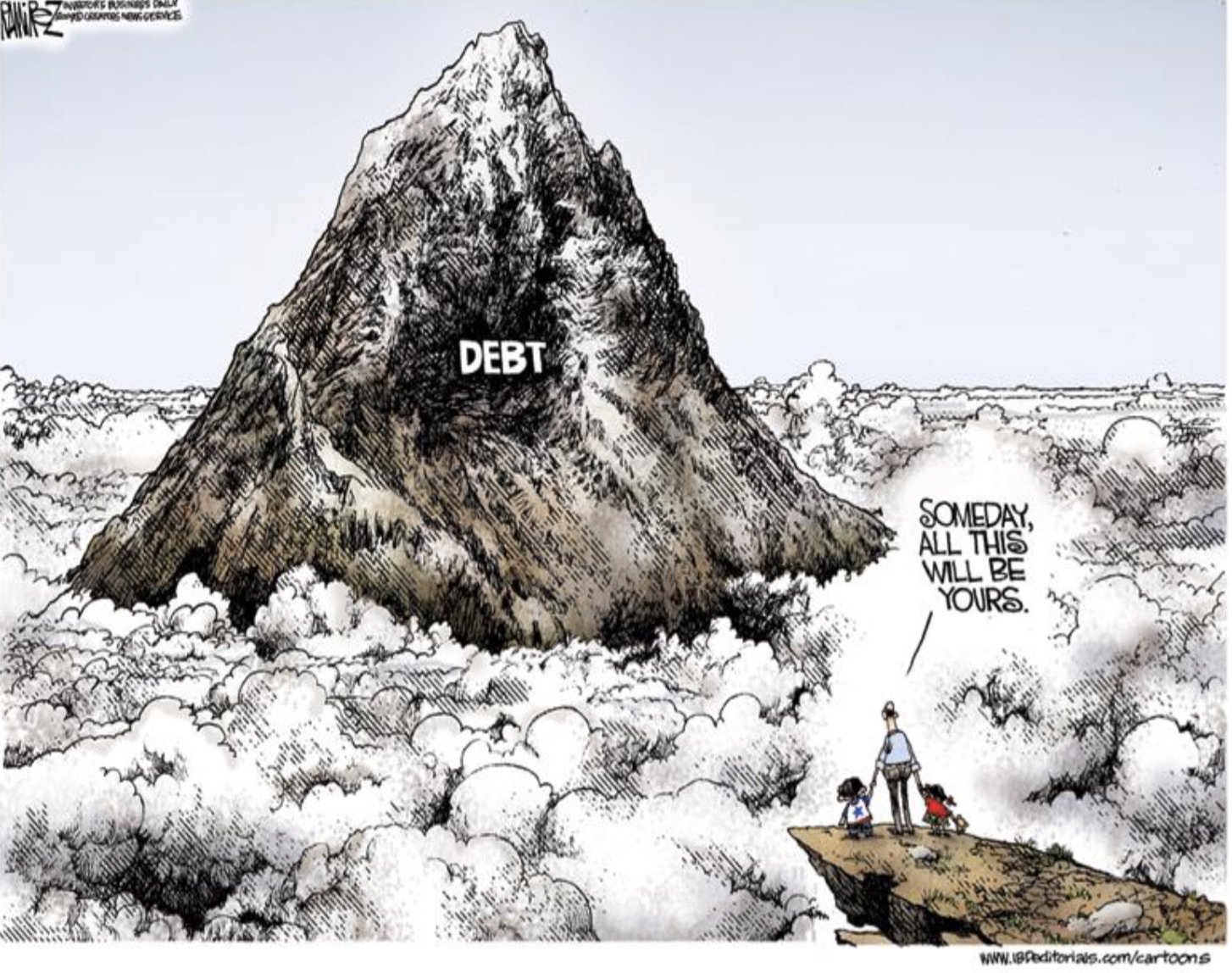 Do you keep an eye on the mountain of debt in the world?
Do you keep an eye on the mountain of debt in the world?
The financial crisis in 2007-08 brought a major crash in the stock markets because of the high debts and unsecured loans. But today the debt around the world is much higher than in 2007.
Did you know that the total government debt in the world has accumulated to $63 trillion in total and the U.S. makes up almost a third of that amount ?
In an ideal situation, governments are just borrowing this money to cover short-term budget deficits or to finance mission critical projects. However, around the globe, countries have taken to the idea of running constant deficits as the normal course of business, and too much accumulation of debt is not healthy for countries or the global economy as a whole.
The U.S. is a prime example of “debt creep” – the country hasn’t posted an annual budget surplus since 2001, when the federal debt was only $6.9 trillion (54% of GDP). Fast forward to today, and the debt has ballooned to roughly $20 trillion (107% of GDP), which is equal to 31.8% of the world’s sovereign debt nominally. Belgium government has the same debt sickness ! They also spend always more than they earn ! You can find a great visualization on the website Visual Capitalist.
Who is going to pay this back ? You and me ? Your kids ? Tell me…
The central bankers of the world have lowered over the past years the interest rates to stimulate the economy and help lower the bill of a loan for companies and governments. But governments haven’t taken the opportunity to clean up their balance sheets. In the contrary..they kept on spending more cheap money.
So now one of the most obvious problems is how will central banks unwind their balance sheets of unprecedented size, during a time of record-high peacetime government debt, while bond yields are at multi-century low interest-rates. The bank’s strategists say they’re “quite confident” there will soon be another financial shock, a pattern that will be repeated until the world figures out a more stable financial framework. We are currently in unexplored territory and central bankers are very cautious with rising their interest rates as they fear the shock effect on the stock markets.
Danger 2 : A Geopolitical Crisis
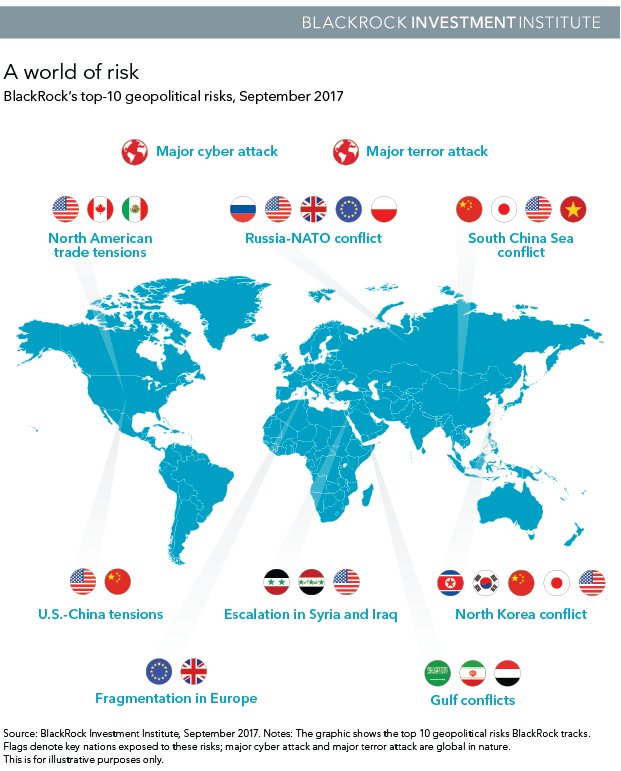
Who would have thought that Poetin would invade Crimea isle in Ukraine ? Who would have imagined that North-Korea could build a missile reaching a US city? Today there are many geopolitical risks in the world. Take a look at the Blackrock Investment institute graph.
Today investors hardly react after North Korea said it successfully tested a hydrogen bomb. What would they do if North Korea launched a hydrogen bomb flying over Japan close to a US city ?
A conflict on the Korean peninsula could eventually bring down the long bull in equities.
Markets definitely need a correction and today there is a significant disconnect between uncertainty and market pricing of risk. North Korea and other geopolitical events can provide the trigger for a stock market correction.
Danger 3 : Anything…
Anything unexpected can always happen ! Markets closed for 6 days following the 9/11 attacks in 2001, in an attempt to forestall a market crash. Despite that effort, on the first trading day after the attacks, the market fell 684 points, or 7.1%, for the largest one-day loss in the history of the stock market. The 1907 stock market crash was set off by the catastrophic San Francisco earthquake of 1906, and the 1987 Black Monday crash was partially impacted by the Iran War.
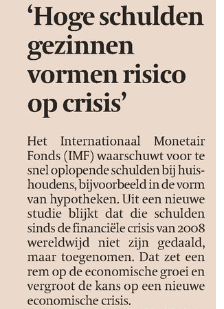
Of course, it’s not always easy to see when a big event will trigger a market crash. That doesn’t stop investors from overreacting to a potential market moving event, though.
There’s one more thing that I want to highlight to you ! On the 4th of october, a a very small article showed up in the Financial Newspaper De Tijd. Did you read it ?
The International Monetary Fund (IMF) warned that debt of families is increasing rapidly. A new study revealed that since the crisis of 2008 family debt has only increased. That can put a constraint on economic growth and increase the risk of a new economical crisis.
Why you may think? Well.. if you have a lot of loans (house, car, other…) you are unlikely to spend money. The US Savings graph shows that families are saving less. Same in Belgium..When people will stop spending money or loans can no longer be paid, a recession will kick in, that is for sure.
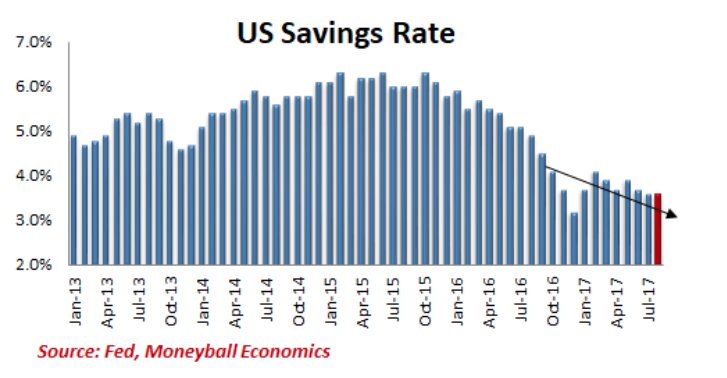
Final Conclusion :
How to prepare yourself for the next market crash ? We have an overvalued market now. Some investors don’t believe we have…Markets go always up and a black swan event is a blip in the history (see graph) in their eyes. There are sufficient financially engineered investment products in today’s marketplace. The question is whether you can make money when markets go down for several months or years..or do you think that you can’t totally prepare yourself for the next stock market crash without completely exiting the investment market.
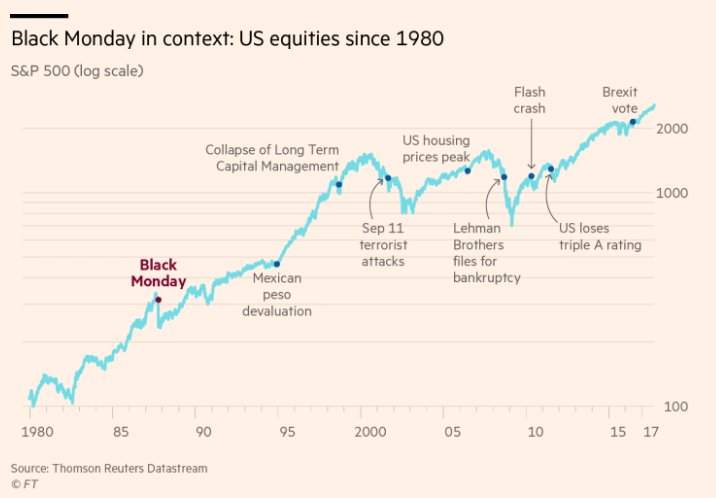
You can always cushion the blow when the inevitable market crash occurs. Your best bet is diversification. Don’t keep all your money in the stock market. Especially as you get older, you should own different asset classes such as some dividend paying holdings, real estate funds, and cash. That way, when the market collapses, you’ll have some assets that won’t fall!
I am personally learning how to make money in downtrending stock markets. Prepare yourself for any market trend is key ! We just know that the day or month when the inevitable market crash will occur is a mystery.
Thanks again for reading and until next time !As always we end this blog post with a quote.


One Response Comment
Good read. Its true alot of stuff can happen. Down here nafta can be a big issue. clearly you can see Canada is trading more with europe already. Which is great. Noone can time the market but we can all admit deals are definally getting harder to find.